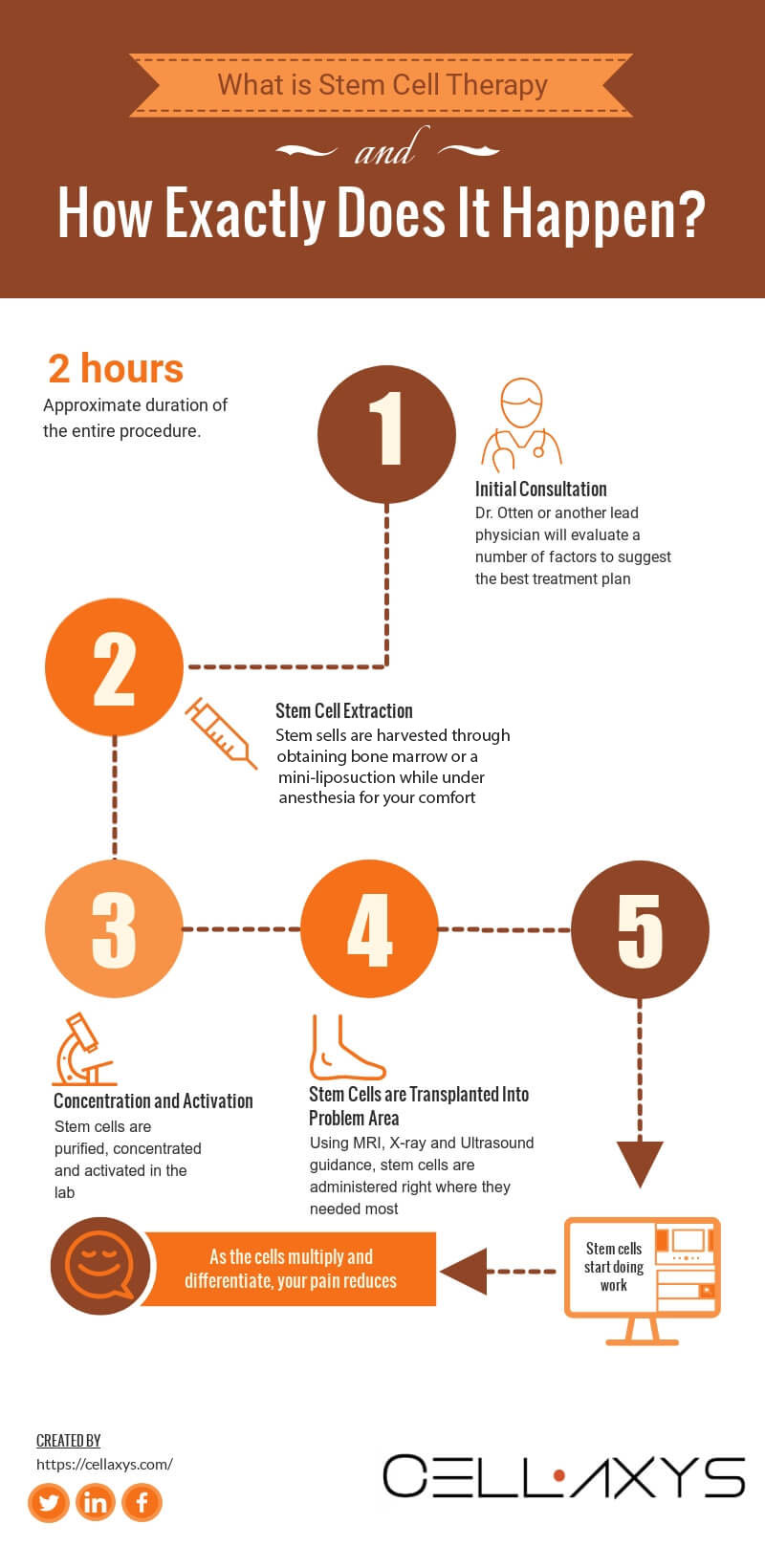 Does Medicare Cover Stem Cell Therapy? What You Need To Know
Does Medicare Cover Stem Cell Therapy? What You Need To KnowDoes Medicare provide coverage for stem cell therapy? The original Medicare and Medicare Advantage plans cover certain types of approved stem cell therapy. Parts A and B (Original Medicare) provide coverage for approved stem cell treatments and associated out-of-pocket costs. Coverage varies between different Medicare options. The goal of stem cell therapy is to restore normal blood production and development in a person whose body has lost this function. This article analyzes stem cell therapy, examines the coverage and costs of each part of Medicare and describes the specific procedures covered by Medicare. It also looks at the costs of outpatient stem cell therapy for people who do not have Medicare. We can use some terms in this piece that can be useful to understand when selecting the best insurance plan: We can use some terms in this piece that can be useful to understand when selecting the best insurance plan: There are two main types of stem cells: embryonic stem cells and adult stem cells. Embryonic stem cells can become all cells of the adult body. Adult stem cells come from an organ or tissue and can become specialized types of cells within the organ or tissue. Adult stem cells act as an internal repair system that replaces injured or ill cells. Because stem cells can repair and replace cells, therapy can help with conditions that have few treatment options. Currently, doctors use stem cells that come from blood or to treat people with immune system diseases and blood disorders. It is possible that, in the future, other uses of the cells may include the manufacture of tissues for people with , , or .Despite the potential, many types of stem cell therapy are harmful and illegal, according to . Although FDA has adopted some types, they have not approved others because of serious security concerns linked to them, such as development. Medicare covers part of the costs of two types of stem cell therapy approved by FDA, or transplants. Coverage applies to transplants, whether doctors perform outpatients or outpatients. Part of Medicare A, which is hospitalization insurance, covers patient transplants. However, part A pay only for admissions falling under a regulation called the . According to this rule, the admitted doctor expects a person to stay in a hospital at least two midnights. Although part A is generally not suitable for shorter hospital stays, Medicare may grant coverage on a case-by-case basis, depending on the trial of the admitted doctor. The cost associated with Part A is deductible. There is a value of $0 for the first 60 days of a hospital stay. Part B of Medicare B, which is medical insurance, covers outpatient transplants that a doctor considers medically necessary. The annual deductible. Once a person complies with the deductible, they usually pay 20% of Medicare approved amounts for medical services and other costs involved in therapy. Part D of MedicareSomeone with original Medicare is eligible to purchase a Part D plan for prescription drug coverage that would include medicines needed for stem cell therapy. Part D deductibles, copayments and co-insurance costs vary according to the policy that a person has acquired. MedigapMedigap is Medicare supplement insurance. People who have original Medicare can buy a Medigap plan, which helps them pay the pocket costs associated with Parts A and B.Medicare Advantage (Part C)Medicare Advantage provides coverage of Parts A and B, and most plans also include prescription drug coverage. Private insurance companies offer Medicare Advantage policies, and because of this, out-of-pocket costs are different from those of original Medicare. Costs disbursed may also vary between plans, but all policies have an annual cost limit. A person with Medicare Advantage should go to a network provider. Medicare covers only two procedures: and Allo-SCTIn Allo-SCT, a health care professional will deliver healthy donor stem cells to a person through intravenous infusion. The purpose is to restore normal blood production in someone whose body is not able to perform this function. A candidate for the transplant can be an individual with a deficiency in blood production. This can be inherited or acquired. An example could be a person with severe aplastic. Before the transplant, a person will be treated to weaken the immune system, such as , , or both, so that the body does not reject donor cells. This treatment also allows donor cells to reach the bone marrow, where they grow and make new blood cells. Complications may include rejection of donor cells (in spite of treatment to weaken immunity). Another possible complication is that donor immune cells can attack a person's healthy cells. In addition to helping the beneficiary with costs, Medicare also helps the donor with costs. Expenditure for covered donors includes medical services, hospital care and follow-up care. The Au-SCTAn Au-SCT procedure restores stem cells without the help of a donor. The purpose of the transplant is to allow the body to resume blood production and development after organs and tissues sustain damage. The transplant candidates include those with blood cancer, such as or .Before an Au-SCT transplant, a health care professional will remove a person's stem cells and freeze them. Then the individual will receive high-dose chemotherapy with or without radiation therapy. The health care professional will then return the stem cells collected to the body. If the procedure works as planned, transplant cells make new blood cells inside the bone marrow. Au-SCT has a higher relapse rate than Allo-SCT, but Au-SCT does not entail the risk of a healthy cell attack because it does not involve donor cells. Stem cell therapy can be very expensive. A 2017 study examined the costs of 1,562 people who had an outpatient Allo-SCT or Au-SCT between 2010 and 2013. The results showed that the costs ranged from $140,792 to $289,283. The costs of the study were claims made to private health companies rather than Medicare. The study did not provide an estimate of the outpatient costs of stem cell therapy. People with Medicare are eligible for coverage of two types of stem cell transplantation. Applicants for therapy may include people with blood disorder, such as aplastic anemia, or someone with blood cancer, such as lymphoma. If an individual has original Medicare, he can buy a Medigap plan, which helps with expenses outside the box. A person with a Medicare Advantage plan will have out-of-pocket costs that differ from those of original Medicare. Stem cell therapy is expensive. Before submitting to one of the transplants, a person may want to review their Medicare plan to get an estimate of both covered and out-of-pocket costs. Information on this website may help you make personal insurance decisions, but it is not intended to provide advice in connection with the purchase or use of any insurance or insurance products. Healthline Media does not transact the insurance business in any way and is not licensed as an insurance company or producer in any jurisdiction of the US. Healthline Media does not recommend or support third parties who may perform insurance transactions. Last medical review on 30 June 2020Most recent newsRelated coverage
Medicare stem cell therapy covers? Certain diseases or medical conditions can be treated or prevented with the use of stem cell therapy. If your needs meet certain requirements for treatment options approved with stem cell therapy, Medicare coverage may be available. Understanding stem cell therapy The stem cells are biological building blocks that are divided and converted into more stem cells or transformed into specialized cells that perform unique functions within the body, such as the development of blood cells, bone cells or cells that form the layers of the skin, brain and muscles of the heart. As a therapeutic tool, stem cells are a form of regenerative medicine and can be used to recover or repair damaged tissues and organs and treat some medical conditions, such as cancer or heart disease. The discovery of stem cell sources in the human body is ongoing, but there are some of the known types of stem cells that naturally occur: Ethical complications and the difficulty of gathering certain stem cells in large quantities sufficient for effective research have led researchers to experiment with the development of artificial stem cells. These scientists have succeeded in reprogramming the genetic code of adult stem cells to behave more like embryonic stem cells. Medicare Coverage for Stem Cell Therapy Due to the experimental nature of most stem cell therapies and ethical complications associated with certain types of stem cells, coverage through Medicare insurance for treatment with stem cell therapy is limited. Examples of commonly approved stem cell therapies for Medicare receptors include: Generally speaking, the type of stem cell therapy should also be approved by the FDA for use and it should be proven that it is medically necessary for Medicare to approve coverage. Testing medical need usually requires documentation that shows all other treatment options for the qualified medical condition have been tested and have not been successful in reducing pain, reversing symptoms or preventing symptoms from getting worse. FDA approval and coverage terms can change from year to year, so you may need to check if the treatment you are looking for is currently approved by the FDA and covered by Medicare. Even with Medicare coverage, stem cell treatment can be costly for patients. Medicare Advantage or Medicare supplement plans that help mitigate your cost-sharing obligations can help you reduce your pocket expenses when you are in need of stem cell therapy. Contact your plan directly for specific information. Related articles: Can't find the answer you're looking for? Talk to an insurance agent authorized since 2006 One of the most common questions we received is: "Can you laminate your Medicare card?" It's a big question because... People who need help getting in and out of their chair daily due to life changes like aging, arthritis,... Everything you need to know Many things have changed since Medicare Part C was formally introduced by legislation in 1997.... Medicare.org A Non-Government Health Care Resources All rights reserved 2020. Medicare.org is private property and operated by HealthCompare, Inc. Medicare.org is a non-governmental resource that provides information about Medicare, Medicare Advantage and more. For Medicare related government resources, visit .Medicare.org A Non-Government Resource for Healthcare All rights reserved 2020. Medicare.org is private property and operated by HealthCompare, Inc. Medicare.org is a non-governmental resource that provides information about Medicare, Medicare Advantage and more. For Medicare government resources, visit .The Medicare Annual Registration Period (AEP) ends Monday night! December 7 is the last day you can make changes to your Medicare plan this year!

Does Medicare Cover Stem Cell Therapy? | Boomer Benefits
Does Medicare provide cover for stem cell therapy? Coverage and more
Does Medicare Cover Stem Cell Therapy? | Boomer Benefits
Does Medicare Pay for Stem Cell Therapy? - Medicare Life Health
Does Medicare Cover Stem Cell Therapy in 2021? Find Out Here
Medicare Coverage for Stem Cell Therapy in 2021 | MedicareFAQ
Does Medicare provide cover for stem cell therapy? Coverage and more
Does Medicare Cover Stem Cell Therapy? | Medicare Treatment Coverage
Does Medicare Cover Stem Cell Therapy?
Does Medicare provide cover for stem cell therapy? Coverage and more
Does Medicare Pay for Stem Cell Therapy? - Medicare Life Health
Does Medicare Cover Stem Cell Therapy?
The Cost of Stem Cell Therapy in 2021
Does Medicare provide cover for stem cell therapy? Coverage and more
Does insurance cover stem cell therapy at unproven clinics? | The Niche
Does Medicare Cover Stem Cell Therapy?
Insurance - Stemcell Therapy in California
The Cost of Stem Cell Therapy in 2021
Clinic pitches unproven treatments to desperate patients, with tips on raising the cash - The Washington Post
When Does Medicare Cover Doctor Visits?_opt.png)
The Cost of Stem Cell Therapy in 2021
Does Stem Cell Therapy Work For Back Pain? - Regenexx
Does Medicare Cover Stem Cell Therapy?
Petition · Get Stem Cell Therapy Covered by Medicare · Change.org
Stem Cell Recruitment Therapy? - Regenexx
Stem Cell Therapy, Explained: Everything You Need To Know
Does Medicare Cover Stem Cell Therapy?
Stem cells: Sources, types, and uses
How Effective Is Stem Cell Therapy? - The Guyer Institute of Molecular Medicine
Stem Cell Treatments Flourish With Little Evidence That They Work - The New York Times
Stem Cell Transplantation (Formerly 110.8.1) (NCD 110.23) – Medicare Advantage Policy Guideline
Medicare to Cover CAR-T Cell Therapy | Cancer Today
Why doesn't insurance cover Stem Cell Treatments or Regenerative Medicine?
Stem Cell Therapy, Explained: Everything You Need To Know
The Cost of Stem Cell Therapy in 2021
Lawmaker plans to take aim at stem cell therapies - VTDigger
Stem Cell Injections | Weil Foot & Ankle Institute
Does Medicare Cover Stem Cell Therapy?
Does Medicare provide cover for stem cell therapy? Coverage and more
 Does Medicare Cover Stem Cell Therapy? What You Need To Know
Does Medicare Cover Stem Cell Therapy? What You Need To Know



















_opt.png)
















Posting Komentar untuk "does medicare cover stem cell injections"